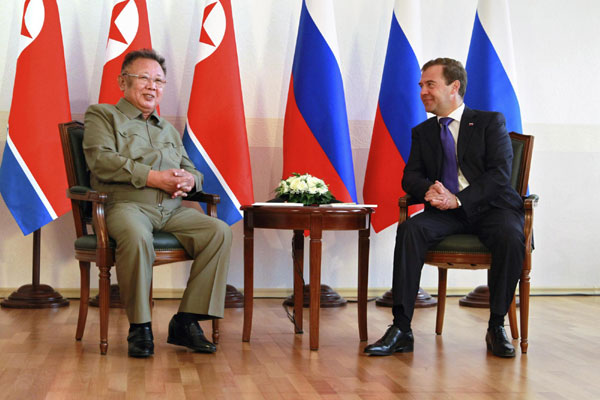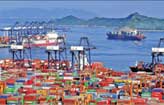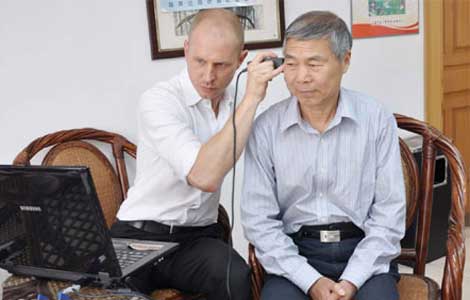Center
Russian, DPRK leaders agree on nuclear issues
Updated: 2011-08-24 22:26
(Xinhua)
 |
|
Russia's President Dmitry Medvedev (R) meets with DPRK leader Kim Jong-il at the "Sosnovyi Bor" military garrison in Siberia's Buryatia region August 24, 2011. [Photo/Agencies] |
MOSCOW - Russian President Dmitry Medvedev and visiting top leader Kim Jong-il of the Democratic People's Republic of Korea (DPRK) agreed Wednesday to resume stalled six-party talks as soon as possible.
During their meeting near the eastern Siberian city of Ulan-Ude, the two leaders also reached consensus on an energy project to build a gas pipeline from Russia to South Korea via the DPRK as well as on the DPRK's outstanding debt to Russia.
Ready to resume nuclear talks
The Russian-DPRK summit was held at a military base in the Sosnovy Bor village, some 50 km from Ulan-Ude, capital of Russia's Buryatia republic.
High on the agenda were closer political dialogues, cooperation among relevant ministries and agencies, and expansion of humanitarian and inter-regional contact, a Kremlin source told the Itar-Tass new agency before the talks.
The DPRK is ready to resume the six-party talks on denuclearization of the Korean Peninsula without preconditions, Russian presidential spokeswoman Nataliya Timakova said after Wednesday's talks.
After the six-party talks stalled in 2008, the United States and South Korea have insisted that Pyongyang agree to a moratorium before any resumption of the talks, which also involve China and Japan.
However, according to the Kremlin spokeswoman, Kim told his Russian counterpart that the DPRK would be ready to resolve the issue of imposing a moratorium on testing and production of missile and nuclear weaponry only "in the course of the talks."
Gas cooperation
In the energy sector, the two leaders agreed to set up a special commission to promote gas cooperation between Russia, the DPRK and South Korea, Medvedev told reporters.
"As regards the gas cooperation, there are results. We have directed our ministries to set up an ad hoc commission to determine the specific parameters of bilateral cooperation on gas transit via the DPRK and therefore to get the Republic of Korea to join this project," Medvedev was quoted by the Interfax news agency as saying.
He stressed that the DPRK is interested in this project and hopes to increase gas supplies.
The Russian president also added that his country has planned to build a 1,100-km gas pipeline this year, which will make it possible to transport up to 10 billion cubic meters of gas a year.
"If there is demand, we are ready to increase our supplies," Medvedev said.
A delegation from Russia's gas giant Gazprom visited the DPRK last week, meeting the country's oil minister and discussing "outstanding issues of cooperation in the energy sphere," the Russian company said.
The construction of the gas pipeline between Russia and South Korea via the DPRK will guarantee the restoration and strengthening of trust between Seoul and Pyongyang, said Georgy Toloraya, a senior researcher at Russia's Institute of World Economy and International Relations.
Hope for debt settlement
Besides, a Russian delegation source revealed that the two leaders also reached a common approach to Pyongyang's Soviet-era loans.
The two countries have agreed to re-start negotiations on the DPRK's 11-billion-US-dollar debt this year, and the Russian side regards this fact as a "huge breakthrough" toward solving this issue, the official said.
Earlier Wednesday, Russian Deputy Finance Minister Sergei Storchak said the DPRK should first recognize Russia as the successor to the Soviet Union.
Then, he added, the two states need to recalculate the sum of the loans, which were issued in Soviet rubles at the exchange rate of 0.6 ruble per dollar.
Moscow sees the loans as one of the factors that hamper trade and economic ties between the two countries.
Kim arrived in Russia's Far East on Saturday on a special train for his third visit to the country in a decade. So far he has visited a hydropower plant in the Far East region, a special tourist zone under construction in Buryatia, the Baikal lake and a helicopter plant.
He would leave Ulan-Ude Wednesday night by his special train.
The DPRK leader visited Russia twice before. From July 26 to August 18, 2001, Kim traveled by rail across Russia from Vladivostok to Moscow and St. Petersburg.
His second visit to Russia was in August 2002. During the four-day trip, Kim studied the Far East region's economic policy.
E-paper

Blue economy gets a lift
Coastal areas of Shandong, Zhejiang and Guangdong to spearhead sector development.
The light touch
Long way to go
Outdoor success
Specials

Star journalist remembered
Friends, colleagues attended a memorial service to pay tribute to veteran reporter Li Xing in US.

Hot pots
Tea-making treasures catch the fancy of connoisseurs as record prices brew up interest

Hear we go
Polish Audiologist helps thousands of Chinese hear for the first time.
